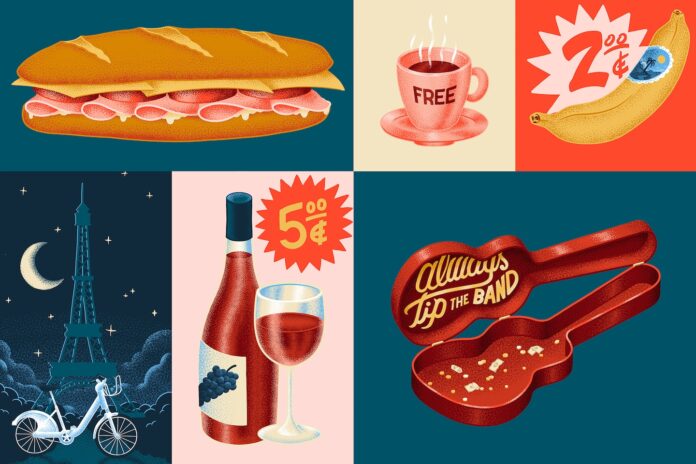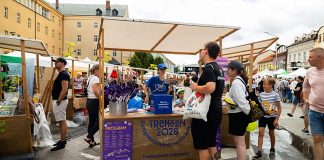Can you still indulge in a city that embraces pleasure while sticking to a budget? I found out.
June 1, 2022 at 9:25 a.m. EDT

Our new diary series explores working remotely on a budget in major cities. Read our first two entries in New York and London.
What it covered: Meals, drinks, transportation, postcards and a tip for a guitarist.
The working spaces: A co-working space, hostel common area, sidewalk cafe, friend’s apartment and park benches.
It feels embarrassing to say Paris is one of my favorite places in the world. It sounds so basic, cheugy even — the pumpkin spice latte of travel. But it’s not the Eiffel Tower, crepes and “Emily in Paris” version of the city that I love; it’s the neighborhood cheese shops, the walkability, the chic residents and the unrushed service at restaurants. It’s a city that embraces pleasure at every turn, from the fresh pastries to public displays of affection.
After nearly a dozen other visits, I returned to Paris last month. It wasn’t like the work trips that landed me in some of the city’s fanciest hotels, and not quite like the personal trips where I stayed in the cheapest Airbnbs possible. Instead, I embraced something in the middle, staying in a private room at a boutique hostel and sticking to a midrange budget. I documented two days of my attempt to balance the lifestyle of a bon vivant with the responsibilities of working on East Coast time.
11:43 a.m., a jet-lagged coffee in the sun
I should have woken up earlier, but I’m working on D.C. time while I’m in Paris. My late start means I missed the Caulaincourt Square hostel’s free coffee and pastries. This is by far the best hostel I have stayed in lately; infinitely nicer than my London stint and more private than the Jackson Hole dorm. I leave my fifth-floor walk-up room, sit at a sunny sidewalk cafe for a cafe noisette (an espresso with a little hot milk) and check my email.
1:20 p.m., an eBike to the perfect sandwich
It’s sandwich-for-breakfast time. In one of his recent newsletters, chef, author and Paris resident David Lebovitz called Le Petit Vendôme his favorite sandwicherie. I rent a Lime eBike and go for a ham and Cantal cheese (plus butter) baguette for $7.50. I take it to the Jardin des Tuileries, a garden near the Louvre, and eat on a park bench. Both the sandwich and the setting are divine. I am in pork heaven.
Takeaway: Paris has so many ways to get around. The Paris Métro is one of the best public transportation systems; one-way tickets start around $2. You’ll find bike and moped rentals all over from vendors such as Uber, Lime, Vélib’ and Cityscoot.
2:30 p.m., an expensive lemonade
Paris may be teeming with cafes, but not many people use their laptops in them. I asked for advice from Meg Zimbeck, the founder and editor in chief of the restaurant review website and food tour company Paris by Mouth. She said remote work in public is becoming normalized and recommended a co-working spot called Anticafé.
I go, and the barista explains it’s about $6.50 an hour or $28 for the day. Rates covered whatever coffee, tea or soft drinks you wanted (if your coffee order exceeded the hourly or daily rate, you paid whatever was the highest). I got a lemonade and a table by a window. It was a productive setting, but the biggest perk was borrowing a phone charger from the barista. I stay three hours, costing €18. It’s the most expensive lemonade I’ve ever had.
Takeaway: A writer friend living in Paris told me that when she wants to work outside of her apartment, she goes to hotel lobbies that serve coffee or even a Starbucks location. It’s not as romantic, but there’s always WiFi.
8 p.m., walking and working
After leaving Anticafé, I walked around and tackled emails from park benches — a sightseeing-working combo. I gave a guitarist by the Louvre a euro. My grandpa was a jazz drummer for 50 years and always told me to “tip the band.”
I meet a friend at Brasserie Bellanger, which he described as “super well loved” with “good food for cheap.” We linger over a glass of wine before ordering chicken liver mousse ($7.50) to start and steak tartare ($15). I knew I had a phone interview at 10:15 p.m., but I wasn’t considering the logistics.
By the time the tartare arrives, I have a half-hour before the call starts. I still need to eat, pay and get somewhere quiet. My friend offers his apartment as a spot, and we shovel our meal down. Not very French.
With other calls to make and a story to work on, I leave my friend’s apartment and walk to my hostel. I buy a dozen postcards at a cheesy tourist shop along the way.
9:30 a.m., freebies at the hostel
It was easier to wake up at a reasonable hour (9 a.m.) after going to sleep at a reasonable hour (1:30 a.m.). I’m just in time for the free coffee and croissants downstairs. Over my breakfast, I work at a table with a leafy garden view. It’s lovely, but I miss people-watching — half of why I come to Paris.
Before I head to lunch, I go for a jog and pass iconic points of interest like the Sacré-Coeur (The Basilica of the Sacred Heart) and Le Clos Montmartre, a real vineyard in the middle of Montmartre.
12:50 p.m., a splurge for lunch
It takes three tries to find a Lime eBike that works. By the time I get to Café les deux Gares, the friends I’m meeting have already ordered a couple of bottles of wine. My budget is doomed.
From the set menu, I order the appetizer and main combination for $21.50. FOMO (fear of missing out) hits immediately, and I switch to three courses for $25.75 to join the others. It’s not a big price difference and yet it feels much more extravagant. It’s not the extra course that will be my downfall; our beverages are running up the tab. I keep this internal battle to myself.
We order much more wine and feast on oysters, sardines, sausage, bread and cheese for dessert. Split between the five of us, our two-hour lunch is about $65 each.
Takeaway: What a place is called matters in France. Bistros tend to be more casual and inexpensive and are open for lunch and dinner; brasseries typically serve French food into the late night; cafes focus on drinks; and restaurants cover the rest.
3:30 p.m., Zoom meetings on a sidewalk
After my splurge lunch, I need to find a place to work now that the East Coast work day is in full swing.
Some awnings of cafes, brasseries and tabacs — places that sell tobacco but may also have a bar or cafe, too — have “WiFi” advertised alongside happy-hour times and what kind of food they serve. The server at one brasserie says it’s fine to work on my laptop, brings over the WiFi password and a glass of rosé — not that I need any more wine after lunch, but it’s one of the cheapest menu items. I take a Zoom meeting while a group of very cool youths chain-smoke at the table next to me.
6:13 p.m., a few euros for some fiber
The brasserie starts filling up, and I don’t want to overstay my welcome. It’s been an eternity since I have had any fruit, so I buy a banana ($2.15) at a produce stand and eat while I walk. Along the way I buy stamps for my postcards ($17).
8:30 p.m., pâté at the kid’s table
More emails and walking. It’s technically dinnertime, and I’m close to a place I’ve wanted to try, Bistrot Paul Bert. Even though I’m not hungry, I go for it.
The server has a table for one available — a corner seat wedged between the bar and front window, tucked behind a load-bearing pole. It feels like I’m a child in timeout, but the spot does have a nice (semi-obstructed) view of the other diners.
The French words for “tap water” escape me, so I order water the other way I know: “une bouteille d’eau minérale, s’il vous plait” (a bottle of mineral water, please). The server brings me my bottle of designer water. My Evian is nearly as much as my meal — a plate of terrine de campagne maison (like a rustic pâté) with cornichons, some greens and a basket of crusty bread, plus a glass of wine.
10:30 p.m., nightcap in the red-light district
I take a seat at a sidewalk table at Le Royal Bar in Pigalle, a red-light district with lots of bars as well as the Moulin Rouge. The place is super cheap: $3.20 for a glass of Pastis, an anise-flavored spirit you dilute with water. I attempt to make it last longer but add way too much water. Ruined drink or not, I am happy writing my postcards and eavesdropping on French conversations I can’t understand.
After my nightcap, it’s back to the hostel for a little work before bed.
With my budget, I had plenty of money to have a decadent time in Paris. I could have been more mindful to be more frugal. Waking up late cost me a free breakfast. The co-working space wasn’t a good use of $19. Being too embarrassed to use English instead of French made me blow $6 on a bottle of water I didn’t want. C’est la vie.
The trickier lesson to learn was how to plan my work schedule realistically. I focused on whether time zones aligned for calls and meetings rather than where I should be for them. More often than not, I was scrambling to find quiet or WiFi. Give yourself plenty of time before important appointments in case you mess up transportation back to your hotel or if a meal out takes longer than expected. Packing as much as you can into a frenzied schedule is a rookie mistake for travelers, anyway.
Unlock the world’s wonders with unforgettable journeys tailored just for you! Whether you crave sun-kissed beaches, thrilling adventures, or rich cultural escapes, your dream destination awaits. Enjoy seamless travel with expert tips, exclusive deals, and handpicked experiences that Turn Every Trip into a lifetime memory.










